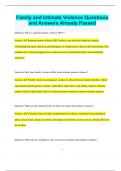Family and Intimate Violence Questions
and Answers Already Passed
Question: What is intimate partner violence (IPV)?
Answer: ✔✔ Intimate partner violence (IPV) refers to any behavior within an intimate
relationship that causes physical, psychological, or sexual harm to those in the relationship. This
includes acts of physical aggression, sexual coercion, psychological abuse, and controlling
behaviors.
Question: How does family violence differ from intimate partner violence?
Answer: ✔✔ Family violence encompasses violence or abuse between family members, which
can include intimate partner violence, child abuse, elder abuse, and sibling violence. Intimate
partner violence specifically refers to violence between current or former romantic partners.
Question: What are the common forms of abuse in family and intimate violence?
Answer: ✔✔ Common forms of abuse include physical violence, emotional or psychological
abuse, sexual abuse, financial control, and neglect. Each form can have serious, lasting effects on
the victims.
Question: What factors contribute to the occurrence of family and intimate violence?
1
,Answer: ✔✔ Contributing factors include substance abuse, economic stress, history of family
violence, societal norms that condone violence, and power imbalances within relationships.
Mental health issues and lack of social support can also play a role.
Question: What is the cycle of violence in the context of intimate relationships?
Answer: ✔✔ The cycle of violence typically includes three stages: the tension-building phase,
where stress and conflict begin to escalate; the acute battering incident, where the actual violence
occurs; and the honeymoon phase, where the abuser may apologize, show remorse, and
temporarily change their behavior.
Question: How can the impact of family violence on children be described?
Answer: ✔✔ Children exposed to family violence may experience trauma, developmental
delays, behavioral issues, anxiety, and depression. They may also struggle with forming healthy
relationships and are at higher risk of becoming perpetrators or victims of violence in adulthood.
Question: What is the role of power and control in intimate partner violence?
Answer: ✔✔ Power and control are central to intimate partner violence, where the abuser seeks
to dominate and control their partner through various forms of abuse, including intimidation,
manipulation, and isolation. The goal is to maintain power over the victim.
2
,Question: What are some strategies for preventing family and intimate violence?
Answer: ✔✔ Strategies include promoting healthy relationships through education,
strengthening economic supports for families, providing early intervention services, improving
access to mental health care, and fostering community environments that discourage violence
and support victims.
Question: What are the barriers to leaving an abusive relationship?
Answer: ✔✔ Barriers include fear of retaliation, financial dependence on the abuser, lack of
support from family or friends, concerns about children, cultural or religious beliefs, and the
hope that the abuser will change. These barriers often make it difficult for victims to leave.
Question: How does financial abuse manifest in intimate relationships?
Answer: ✔✔ Financial abuse involves controlling a partner's access to financial resources,
preventing them from working, stealing their money, or running up debts in their name. This
form of abuse is used to maintain power and control over the victim by limiting their
independence.
Question: What are the legal protections available for victims of family and intimate violence?
3
, Answer: ✔✔ Legal protections include restraining orders, orders of protection, child custody
arrangements, and criminal charges against the abuser. These measures are designed to provide
safety and legal recourse for victims.
Question: How can communities support survivors of family and intimate violence?
Answer: ✔✔ Communities can support survivors by providing accessible resources such as
shelters, counseling services, legal aid, and hotlines. Public awareness campaigns, support
groups, and training for professionals can also help create a supportive environment for
survivors.
Question: What role does mental health play in family and intimate violence?
Answer: ✔✔ Mental health issues can be both a cause and a consequence of family and intimate
violence. Victims often experience depression, anxiety, PTSD, and other mental health
conditions as a result of abuse. Addressing mental health needs is crucial for recovery and
prevention.
Question: How can family violence impact the elderly?
Answer: ✔✔ Elder abuse is a form of family violence that can involve physical harm, emotional
abuse, neglect, financial exploitation, and abandonment. Elderly victims may be particularly
vulnerable due to physical frailty, cognitive impairments, and dependence on their caregivers.
4




